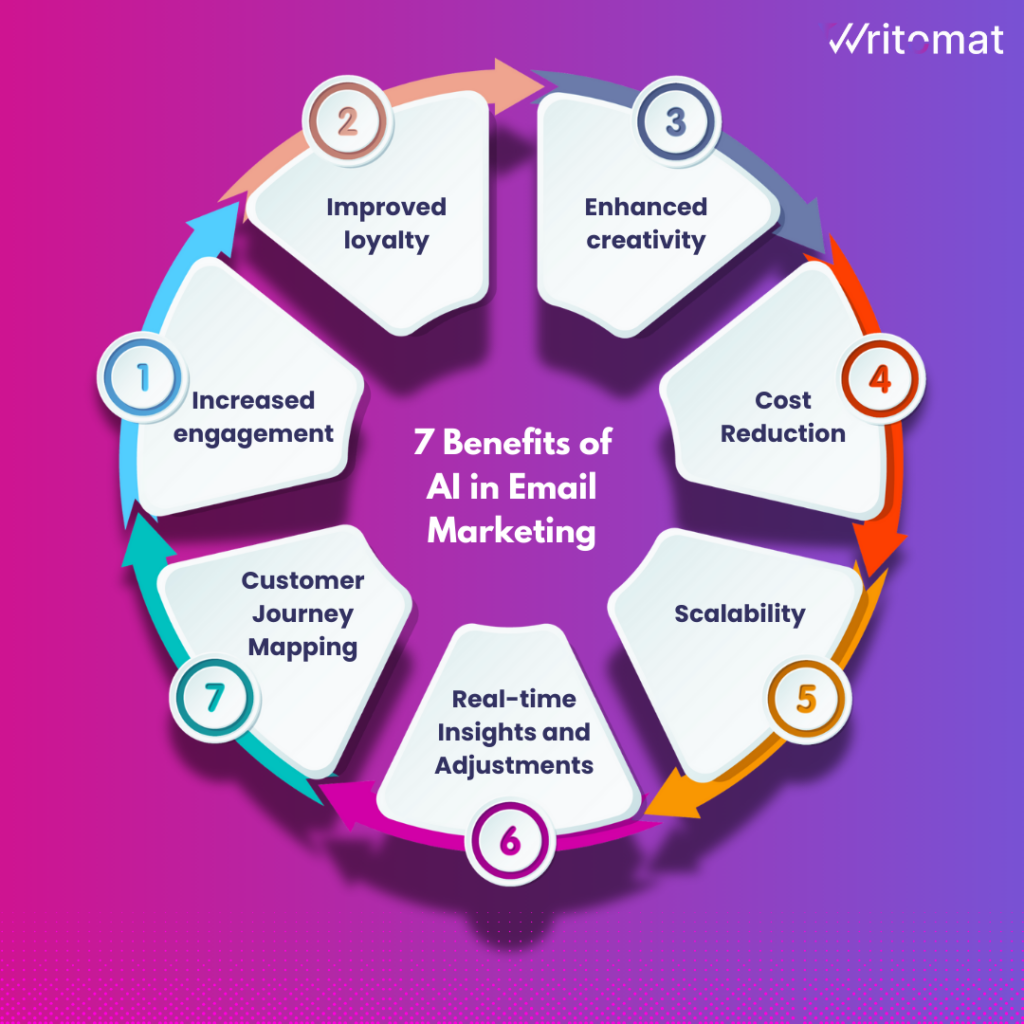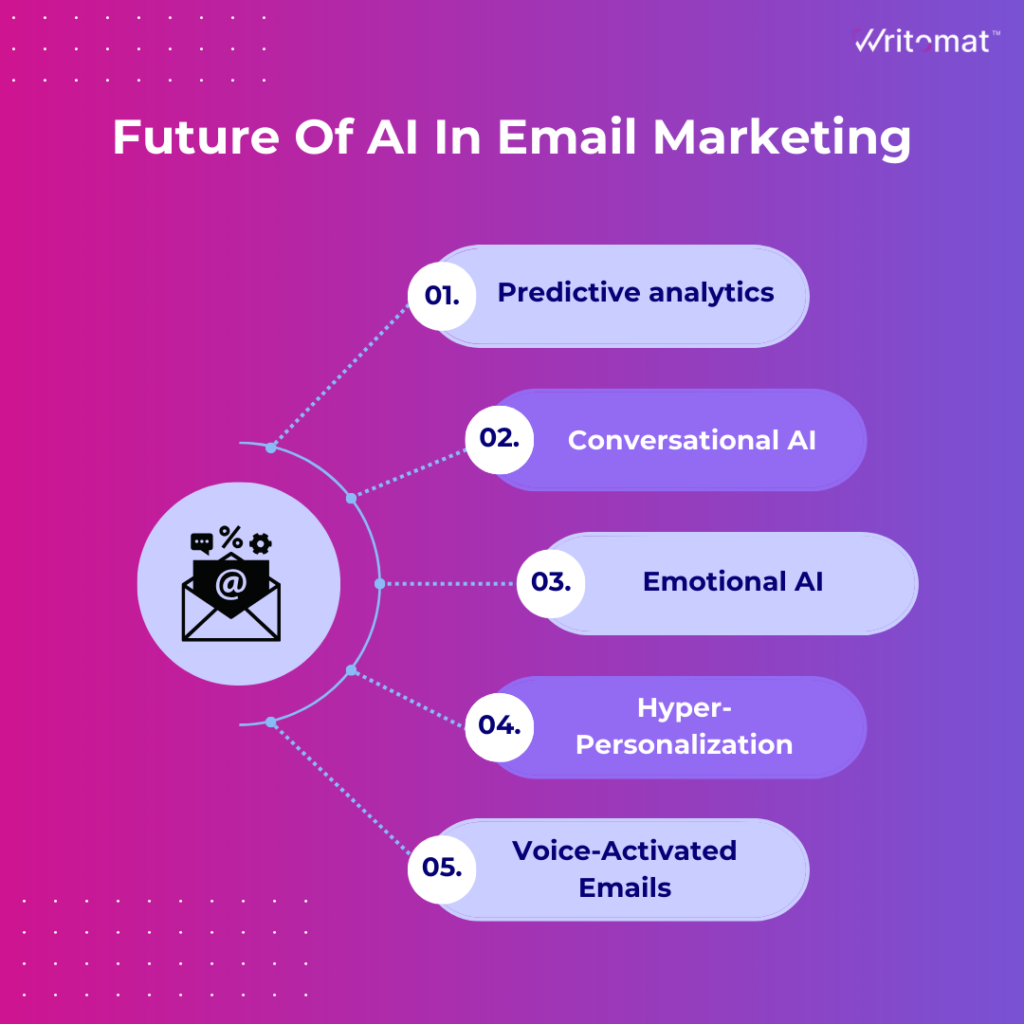Introduction
Email marketing is one of the most effective and widely used digital marketing strategies. According to a report by Litmus, email marketing has an average return on investment (ROI) of 42:1. However, email marketing also faces many challenges, such as low open rates, high unsubscribe rates, spam filters, and increasing competition. How can email marketers overcome these challenges and optimise their campaigns? The answer is artificial intelligence (AI).In this blog, we explore AI in Email Marketing: Personalization and Efficiency.
Understanding AI in Email Marketing
AI is the technology that enables machines to perform tasks that normally require human intelligence, such as learning, reasoning, and decision-making. AI can help email marketers in various ways, such as:
1. Personalization: AI can help email marketers create personalised and relevant messages for each subscriber, based on their behaviour, preferences, and interests. For example, AI can help segment the audience, recommend products or services, tailor the subject line and content, and optimise the send time and frequency.
- Dynamic Content: AI can create dynamic email content that changes based on real-time data, ensuring each subscriber sees the most relevant information.
- Behavioural Triggers: AI can automate emails triggered by specific subscriber actions, such as cart abandonment, browsing history, or past purchases, ensuring timely and relevant communication.
2. Efficiency: AI can help email marketers automate and streamline their workflows, saving time and resources. For example, AI can help design and test email templates, generate and optimise copy, analyse and report performance, and improve deliverability. This contributes to AI in Email Marketing: Personalization and Efficiency.
- Cross-Platform Integration: AI can integrate with CRM systems, social media platforms, and e-commerce tools, creating a cohesive marketing strategy and ensuring data consistency.
- Resource Allocation: AI can analyse campaign performance and allocate resources more effectively, ensuring that the most impactful strategies receive the necessary focus and budget.
Examples and Stats
AI in email marketing is not a futuristic concept, but a reality many brands are already use and benefit from. Here are some examples and stats that illustrate the power and potential of AI in email marketing:
- Netflix: Netflix uses AI to personalise its email campaigns based on each subscriber’s viewing history and preferences. Netflix also uses AI to generate catchy and relevant subject lines, such as “Watch this now, thank us later” or “You need to see this, trust us”. Netflix’s email campaigns have an average open rate of 28.8%, higher than the industry average of 18.1%.
- Sephora: Sephora uses AI to create personalised and interactive email campaigns that offer product recommendations, beauty tips, and quizzes. Sephora also uses AI to optimise the send time of each email, based on the subscriber’s past engagement patterns. Sephora’s email campaigns have an average click-through rate of 18.9%, higher than the industry average of 2.6%.
- Spotify: Spotify uses AI to analyse user listening habits and send personalised playlists and recommendations via email. This personalisation has contributed to high user engagement and retention rates.
- Amazon: Amazon’s AI-driven email campaigns suggest products based on browsing history, purchase history, and user preferences, significantly boosting their email conversion rates.
- Adobe: Adobe uses AI to send personalised product tutorials and recommendations to its software users based on their activity and engagement. This has led to a 30% increase in click-through rates and a 20% increase in software adoption rates.
Benefits of AI in Email Marketing
AI in email marketing can provide many benefits for both email marketers and subscribers, such as:

- Increased engagement: AI can help email marketers create more engaging and relevant email campaigns, that capture the attention and interest of the subscribers. This can lead to higher open, click-through, and conversion rates.
- Improved loyalty: AI can help email marketers build stronger and lasting relationships with their subscribers, by providing personalised and valuable content, offers, and experiences. This can lead to higher retention rates, repeat purchases, and referrals.
- Enhanced creativity: AI can help email marketers unleash their creativity and innovation, by providing new ideas, insights, and opportunities. Email marketers can utilise AI to conduct experiments and gain insights from their outcomes, thus enhancing their email campaigns progressively.
- Cost Reduction: By automating repetitive tasks and optimising resource allocation, AI can reduce operational costs and improve ROI.
- Scalability: AI enables marketers to scale their campaigns effortlessly, handling increasing volumes of data and subscribers without compromising personalisation or efficiency.
- Real-time Insights and Adjustments: AI can provide real-time data analysis and feedback, allowing email marketers to make immediate adjustments to their campaigns. This ensures that strategies are always aligned with current trends and subscriber behaviours, leading to more effective email marketing efforts.
- Enhanced Customer Journey Mapping: AI can analyze and predict the entire customer journey, providing insights into the best touchpoints for engagement. This allows email marketers to create cohesive and well-timed campaigns that guide subscribers through the sales funnel more efficiently.
Challenges of AI in Email Marketing
In email marketing, there are also challenges and limitations associated with AI.
- Data quality: Large and precise datasets are essential for AI to learn and operate efficiently. Marketers using email may require assistance in ensuring data quality, including dealing with incomplete, outdated, or inaccurate data, as these issues can impact the reliability and performance of AI.
- Ethical and legal issues: AI introduces significant ethical and legal considerations in email marketing, particularly concerning privacy, consent, transparency, and accountability. Email marketers must adhere strictly to relevant laws and regulations, such as the General Data Protection Regulation (GDPR). Respecting the rights and preferences of subscribers is paramount, ensuring that AI-driven practices uphold ethical standards while enhancing campaign effectiveness.
- Human oversight: AI is not a substitute for human judgment and expertise, but a tool that can augment and assist email marketers. Email marketers need to monitor and evaluate the performance and impact of AI, and intervene when necessary, to ensure that their email campaigns are aligned with their goals and values.
- Algorithm Bias: AI algorithms can sometimes perpetuate existing biases in the data, leading to skewed results. Marketers must regularly audit their AI systems to ensure fairness and accuracy.
- Technical Expertise: Implementing AI in email marketing requires a certain level of technical expertise. Marketers may need to invest in training or hiring skilled professionals to manage AI tools effectively.
Future of AI in Email Marketing

AI in email marketing is not a trend, but a transformation that is reshaping the email marketing landscape. AI will continue to evolve and improve, and offer new and exciting possibilities for email marketers, such as:
- Predictive analytics: AI will be able to predict the future behaviour and outcomes of the subscribers, such as their likelihood to open, click, convert, or churn. This will enable email marketers to anticipate and influence the subscriber’s actions and optimise their email campaigns accordingly.
- Conversational AI: AI will be able to create and maintain natural and human-like conversations with the subscribers, through email or other channels, such as chatbots or voice assistants. This will enable email marketers to provide more interactive and personalised experiences and increase the engagement and loyalty of the subscribers.
- Emotional AI: AI will be able to detect and respond to the emotions and sentiments of the subscribers, such as their mood, tone, and satisfaction. This will enable email marketers to create more empathetic and emotional email campaigns, that resonate and connect with the subscribers.
- Hyper-Personalization: As AI algorithms become more sophisticated, they will be able to create even more personalised experiences, predicting subscriber needs before they are even expressed.
- Voice-Activated Emails: With the rise of voice assistants, AI could enable voice-activated email interactions, allowing subscribers to manage their emails using voice commands, creating a seamless and hands-free experience.
Conclusion
AI in email marketing is a powerful and promising technology that can help email marketers create more personalised and efficient email campaigns that deliver better results and experiences for both email marketers and subscribers. However, AI also comes with some challenges and limitations that email marketers need to be aware of and address. AI is not a magic bullet, but a strategic partner, that can help email marketers achieve their email marketing goals and objectives. By embracing AI, email marketers can stay ahead of the competition and continuously improve their campaigns for greater success.
Learn how Writomat leverages AI to automate various marketing workflows. Contact our experts today for a quick demo!
👉 Try for free! Claim your offer here.
Frequently Asked Questions
1: How does AI enhance personalization in email marketing?
AI enhances personalization in email marketing by analyzing subscriber behaviour, preferences, and interests to create tailored messages. It helps segment the audience, recommend products or services, and optimize subject lines and content. AI-driven email campaigns can also adjust send times and frequencies for maximum impact.
2: What are the benefits of dynamic content and behavioural triggers in email marketing?
Dynamic content allows emails to change based on real-time data, ensuring each subscriber sees the most relevant information. Behavioural triggers automate emails based on specific actions, such as cart abandonment or past purchases, leading to timely and relevant communication. These strategies increase subscriber engagement and conversion rates.
3: How does AI contribute to the efficiency of email marketing campaigns?
AI contributes to the efficiency of email marketing campaigns by automating tasks like designing templates, generating copy, and analyzing performance. It integrates with CRM systems and social media platforms, ensuring data consistency and cohesive strategies. AI also helps allocate resources effectively, enhancing overall email campaign performance.
4: What are the potential challenges of using AI in email marketing?
Challenges of using AI in email marketing include ensuring data quality, addressing ethical issues related to privacy and consent, and managing algorithm bias. Additionally, marketers need technical expertise to implement and oversee AI tools effectively. Regular monitoring and human oversight are essential to maintain alignment with marketing goals.
5: What future trends can we expect in AI for email marketing?
Future trends in AI for email marketing include predictive analytics, which will forecast subscriber behaviour and optimize campaigns accordingly. Conversational AI will enable natural interactions through chatbots and voice assistants. Emotional AI will respond to subscriber emotions, creating empathetic campaigns. Hyper-personalization and voice-activated emails will further enhance the subscriber experience.
Leave a Reply